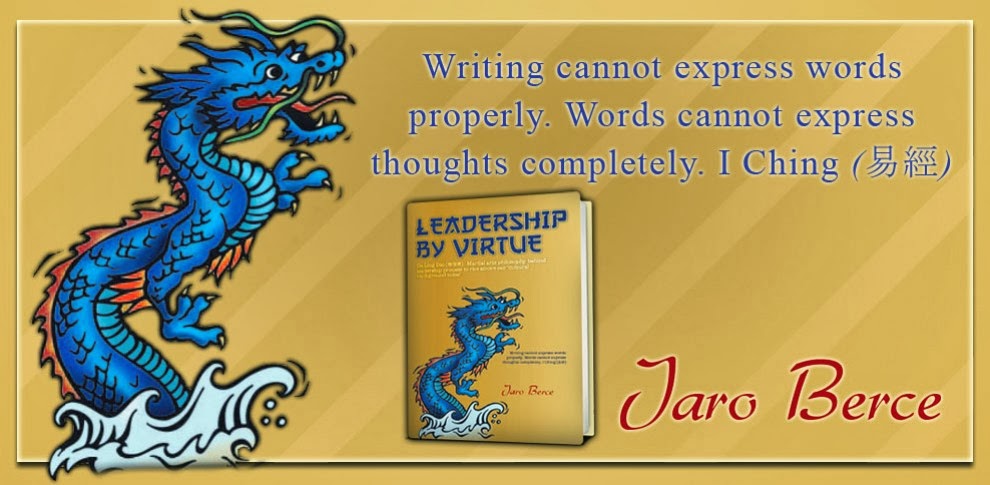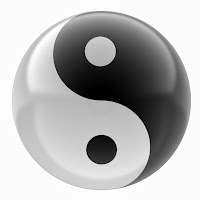In my blogs I have been using a term Dào (Dao, Tao) and would like to share with you my understanding of the meaning of the concept.
Dào is usually translated as way, road, channel, path, doctrine, or line. Chinese language is a tonal language so we must not confuse Dào with Dǎo, although for us it sounds the same. The latter, Dǎo, has an entirely different meaning: to lead, to transform, to guide, to conduct and or to direct.
There are some who would like to believe that Dào is a sort of ultimate creator, a God? It is not. God interferes with people and things, Dào never does. It is said that he who pursues Dào does less day by day. Less and less is done until nothing is done at all; when nothing is done at all, nothing is left undone. This is the fundamental difference between God and Dào – there is no interference when Dào is in concern. At the same time we should understand that Dào in Daoism can have dual meaning. One is religious and the other philosophical. The understanding and use of Dào in my book Leadership by Virtue is the latter.
Leadership dilemma
What made Apple so successful and a very good place to work? ”The lack” of bureaucracy within projects, engineer-focused corporate culture, emphasis on passionate and loyal employees, the huge company has maintained the corporate culture from the start-up days, said Bianca Males in ‘8 Management Lessons I Learned Working at Apple.’ Is that all?
John Harvey-Jones claims: “If a company is successful, it is due to the effort of everyone, but if it fails, it is because of the failure of the board. If the board fails, it is the responsibility of the chairman, notwithstanding the collective responsibility of everyone.” This is a better, but still not an all-encompassing answer.
John Harvey-Jones claims: “If a company is successful, it is due to the effort of everyone, but if it fails, it is because of the failure of the board. If the board fails, it is the responsibility of the chairman, notwithstanding the collective responsibility of everyone.” This is a better, but still not an all-encompassing answer.
Least of effort in leadership
The Mandarin Chinese word wú wéi could be described: ‘by inaction nothing is left undone.’ It may well be also translated as ‘non-acting makes all action possible.’ Lǎo Zǐ, a philosopher of ancient China and the author of the Dào Dé Jīng, in stanza 38 ‘About Dé of the Dào’ described it as:
High virtue by obliging not acquires moral force.
 Dào is usually translated as way, road, channel, path, doctrine, or line and by Chinese opinion cannot be obtained as virtue cannot be approached. The legendary Chinese sovereign and cultural hero Yellow Emperor (reigned from 2.696–2.598 BE) said that once Dào is lost, virtue arises; once virtue is lost, humaneness arises; once humaneness is lost, righteousness arises; once righteousness is lost, formalism arises. But formalism is the flowery representation of Dào and the beginning of disorder.
Dào is usually translated as way, road, channel, path, doctrine, or line and by Chinese opinion cannot be obtained as virtue cannot be approached. The legendary Chinese sovereign and cultural hero Yellow Emperor (reigned from 2.696–2.598 BE) said that once Dào is lost, virtue arises; once virtue is lost, humaneness arises; once humaneness is lost, righteousness arises; once righteousness is lost, formalism arises. But formalism is the flowery representation of Dào and the beginning of disorder.
High virtue by obliging not acquires moral force.
Low virtue obliges always and thus lacks moral force.
High virtue neither strives nor acts for its own ends.
Low virtue does not strive but acts for its own ends.
 Dào is usually translated as way, road, channel, path, doctrine, or line and by Chinese opinion cannot be obtained as virtue cannot be approached. The legendary Chinese sovereign and cultural hero Yellow Emperor (reigned from 2.696–2.598 BE) said that once Dào is lost, virtue arises; once virtue is lost, humaneness arises; once humaneness is lost, righteousness arises; once righteousness is lost, formalism arises. But formalism is the flowery representation of Dào and the beginning of disorder.
Dào is usually translated as way, road, channel, path, doctrine, or line and by Chinese opinion cannot be obtained as virtue cannot be approached. The legendary Chinese sovereign and cultural hero Yellow Emperor (reigned from 2.696–2.598 BE) said that once Dào is lost, virtue arises; once virtue is lost, humaneness arises; once humaneness is lost, righteousness arises; once righteousness is lost, formalism arises. But formalism is the flowery representation of Dào and the beginning of disorder. Two sides of the same coin
What constitutes to be a superior leader? F. Marcos said: Leadership is the other side of the coin of loneliness, and he who is a leader must always act alone. And acting alone, accept everything alone (brainyquote). So, is it a head or is it a tail?
 My lessons from “the other side of a coin” started when, together with my sons, we decided to go to the Mount Kilimanjaro. My decision had nothing to do with Kilimajaro being the biggest free standing mountain in the world or because it is the tallest mountain of the African continent and not even because it bares my name in it. I joined the idea because it was my long lived dream since the times I lived in Africa.
My lessons from “the other side of a coin” started when, together with my sons, we decided to go to the Mount Kilimanjaro. My decision had nothing to do with Kilimajaro being the biggest free standing mountain in the world or because it is the tallest mountain of the African continent and not even because it bares my name in it. I joined the idea because it was my long lived dream since the times I lived in Africa.
To climb the summit of 5.895 m in eight days via Lemosho route had to be planned well in advance as we were not physically fit for such a challenge. For months prior to the challenge we have been successful at climbing and trekking to each and every hill or mountain available to us in Slovenia. After Kilimanjaro I realize that it was not the trekking of more than 70 km or freezing temperatures that we have underestimated. It was “the other side of a coin.”
High altitude and lack of oxygen proved to be subjected to our naivety in thinking that climbing such a mountain is only a physical challenge. Slow walk, introduced by our guides from the ANDA African Adventure, at the beginning of our tour seemed ridiculous to us, but each succeeding day on the mountain proved that it was the only compulsory physical possibility for success.
 My lessons from “the other side of a coin” started when, together with my sons, we decided to go to the Mount Kilimanjaro. My decision had nothing to do with Kilimajaro being the biggest free standing mountain in the world or because it is the tallest mountain of the African continent and not even because it bares my name in it. I joined the idea because it was my long lived dream since the times I lived in Africa.
My lessons from “the other side of a coin” started when, together with my sons, we decided to go to the Mount Kilimanjaro. My decision had nothing to do with Kilimajaro being the biggest free standing mountain in the world or because it is the tallest mountain of the African continent and not even because it bares my name in it. I joined the idea because it was my long lived dream since the times I lived in Africa.To climb the summit of 5.895 m in eight days via Lemosho route had to be planned well in advance as we were not physically fit for such a challenge. For months prior to the challenge we have been successful at climbing and trekking to each and every hill or mountain available to us in Slovenia. After Kilimanjaro I realize that it was not the trekking of more than 70 km or freezing temperatures that we have underestimated. It was “the other side of a coin.”
High altitude and lack of oxygen proved to be subjected to our naivety in thinking that climbing such a mountain is only a physical challenge. Slow walk, introduced by our guides from the ANDA African Adventure, at the beginning of our tour seemed ridiculous to us, but each succeeding day on the mountain proved that it was the only compulsory physical possibility for success.
Subscribe to:
Posts (Atom)




